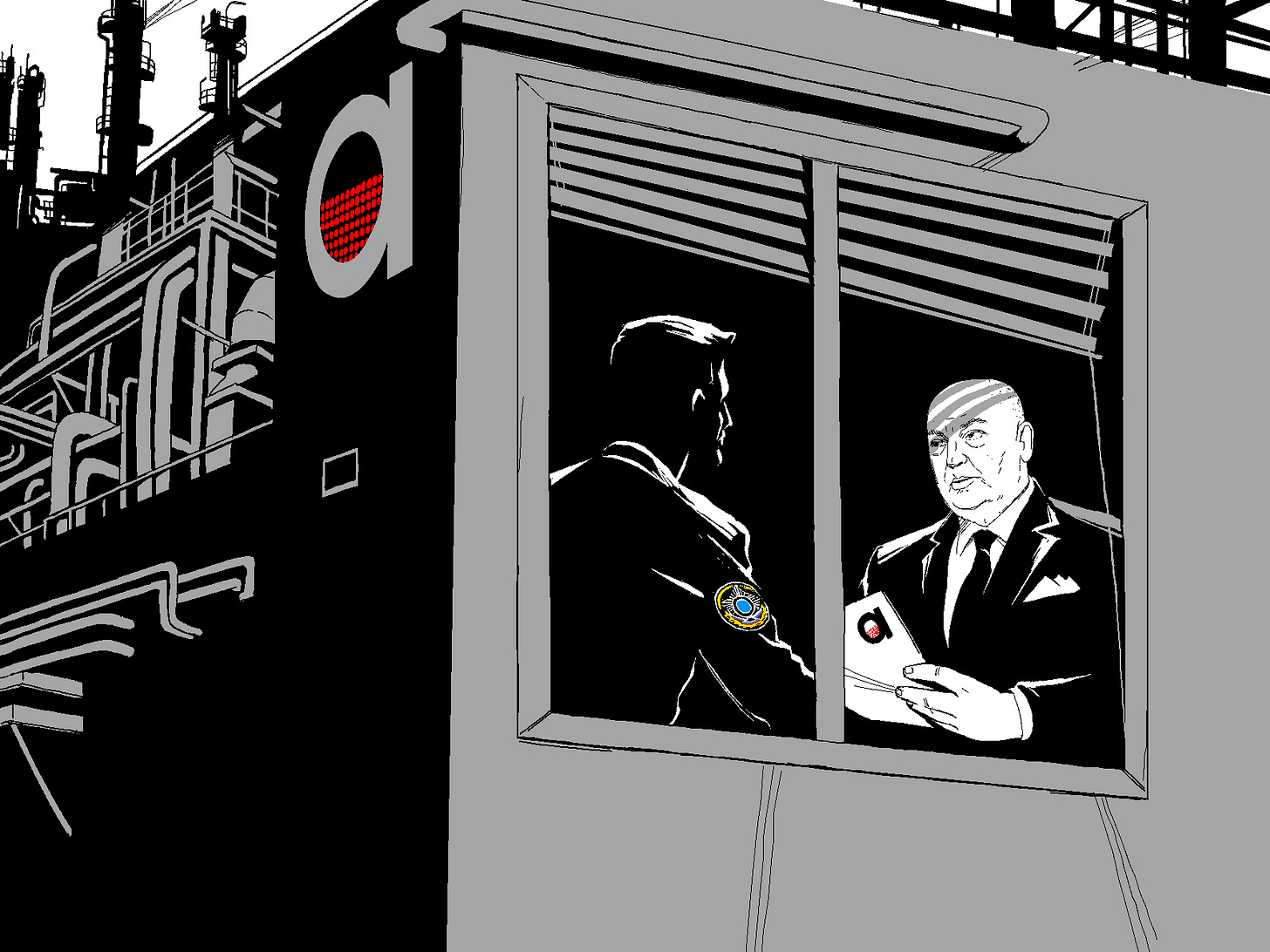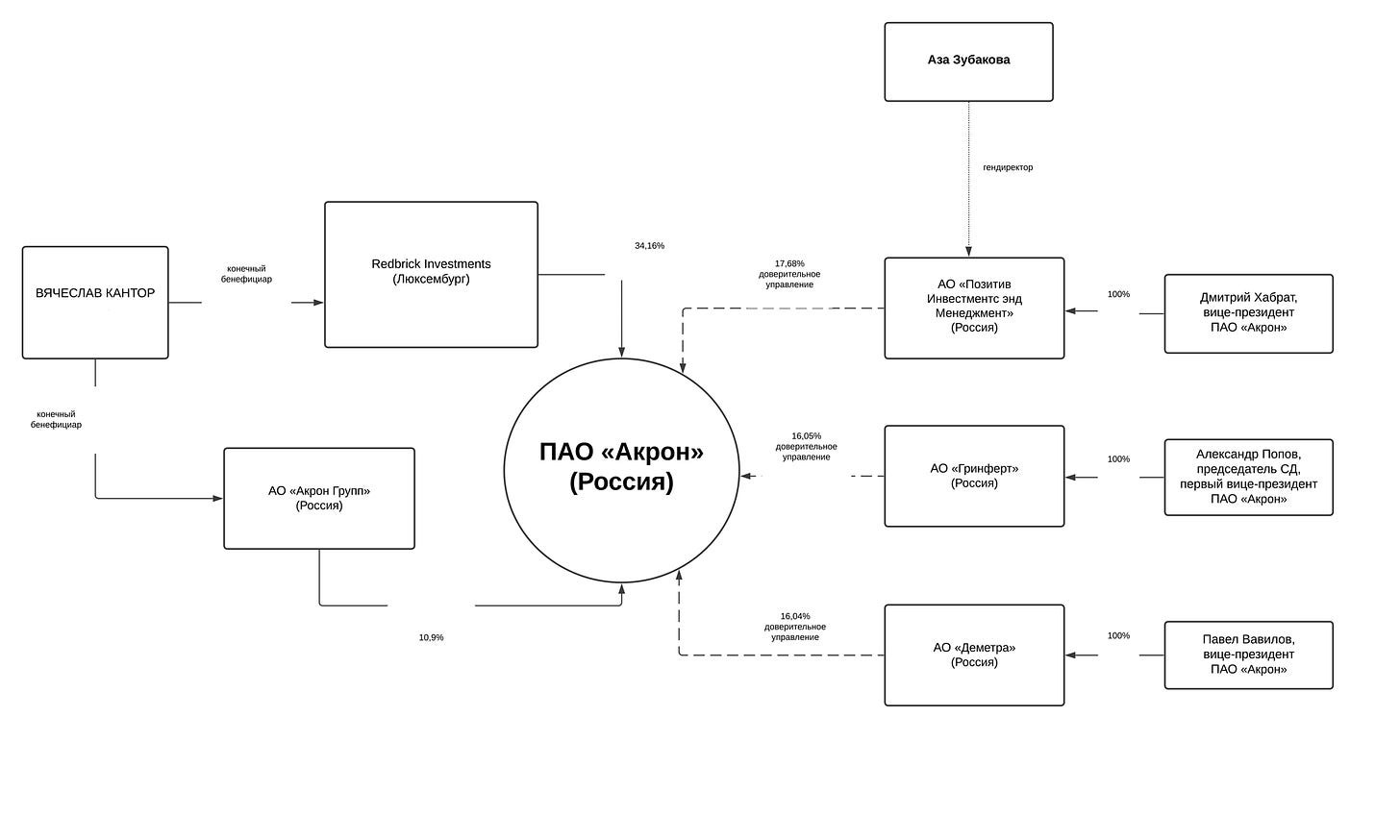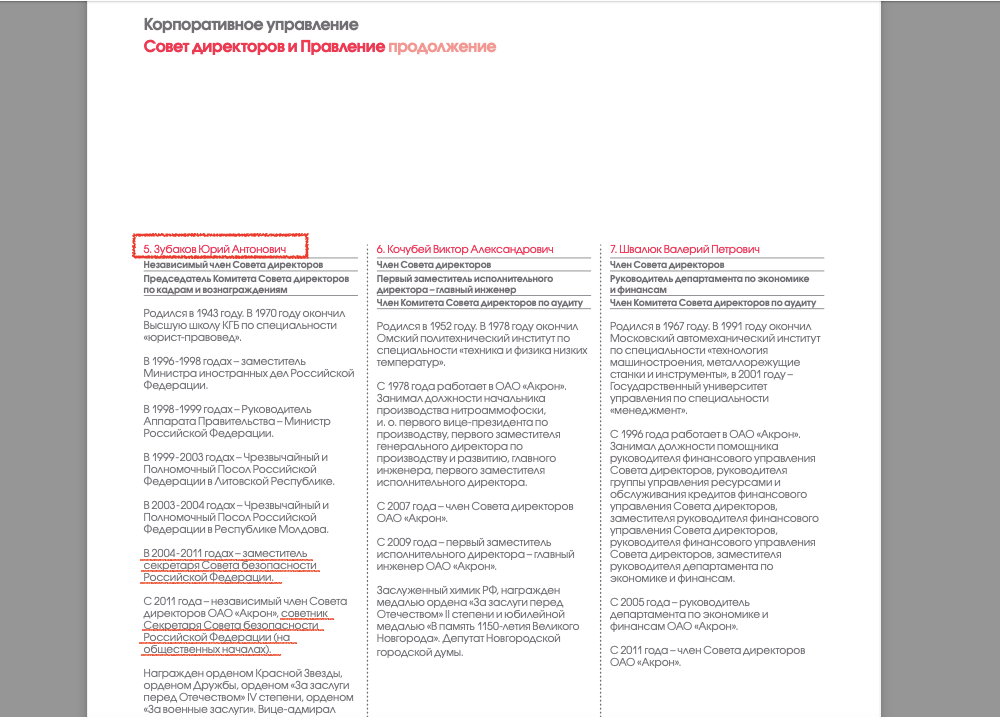Dossier Center translation: Oligarch from the gray zone
How Vyacheslav Kantor, who made his fortune thanks to corruption, friendship with the security forces and promotion of Putin’s propaganda, is trying to escape Western sanctions
February 26, 2024
Dossier Center Investigation in Russian
On February 21, 2024, Reuters reported that the European Union intends to lift sanctions against Yandex co-founder Arkady Volozh and two other oligarchs. According to the publication's sources among European diplomats, Alisher Usmanov, racer Nikita Mazepin and billionaire Vyacheslav Kantor are also trying to get out of the restrictions - Hungary is lobbying for their exclusion from the lists.
Vyacheslav Kantor filed a lawsuit in the European court, trying to prove that he was never close to the Putin regime and built his business honestly. As the Dossier Center found out, Kantor’s hidden business partner for decades could have been Yuri Zubakov, former deputy director of the Foreign Intelligence Service, and later deputy secretary of the Russian Security Council. Currently, a relative of Zubakov controls shares of Kantor’s enterprise with a market value of about 120 billion rubles. Kantor does not have disdain for smaller officials either: in 2022, his company spent almost a million rubles on a hotel for the namesake of the Smolensk United Russia deputy Yuri Chernyak - exactly at the moment when lawyers convinced the EU to lift sanctions because Kantor is far from the Russian government.
Vyacheslav Kantor is a non-public businessman and little known to the general public, but in the latest Forbes ranking he ranks 11th with a fortune of more than $11 billion. During the war, his capital more than doubled, helped by soaring prices for fertilizers, and that is Kantor’s primary business.
His enterprises produce fertilizers in Russia, but Kantor has been living abroad since the early 90s. He mainly resides in London, and during his children’s school holidays in Sardinia, according to Kantor’s comments in an interview. But due to European and English sanctions, the businessman, at a minimum, lost Sardinia.
“The Dossier” tells the story of this non-public oligarch for a simple reason - Kantor embodies the traits of dozens of similar characters who corrupted the Russian system, while simultaneously choosing to live in the West. After the start of the war, all of them are desperately trying to “wash themselves” from Putin and his entourage. It would be unfair if they succeeded.
This investigation was prepared by the Dossier Center together with Matei Rosca, a journalist with the International Consortium of Investigative Journalists ( ICIJ ), and founder of Reporter. London.
Evidence in “Evening Murmansk”
“The security and development of the country is an important job for all citizens. And this is what the president and his assistants are doing. For example, Vyacheslav Kantor and Vladimir Putin collaborate on a variety of projects,” begins a note in the newspaper “Evening Murmansk” marked “advertising” dated July 2020. It looks like the text was written by a fifth grader. It is reported that Kantor is collaborating with Putin in agriculture, and they are also fighting global extremism and terrorism together. “These are just some of the projects in which these two men collaborate,” the author concludes.
It is unlikely that anyone would have paid attention to this strange paid note, devoid of texture, but European officials used it in all seriousness when introducing sanctions against businessman Vyacheslav Kantor, a close associate of Putin. Moreover, they completely forgot about the “advertising” mark - but all this was later found out by Politico magazine in a large article about what is wrong with the EU sanctions.
Kantor was sanctioned by the EU on April 8, 2022, for his “close ties to Putin,” which “helped him maintain a significant fortune, ” and for “openly declaring his support for and friendship with Putin.” In the fall of 2022, Kantor filed a lawsuit against the decision of the EU in a court in Luxembourg. His main arguments: He was never a close friend of Putin, saw him only at general events, and the accusations were based on automatically translated publications from Russian, including paid articles from Vecherny Murmansk and Rambler, Politico wrote.
Kantor may still have a chance to win. Last September, the European Union did not extend its sanctions against several Russian businessmen, including Grigory Berezkin. No official reason was given. Even though Berezkin built his business precisely on his proximity to Russian authorities - on servicing state-owned companies like Russian Railways and Transneft. As the Dossier Center found out, it was Berezkin who was supposed to become one of the beneficiaries of the scandalous Shies landfill in the Arkhangelsk taiga (more about him in the box below).

However, it seems that EU officials did not have the time or resources to properly investigate Berezkin and his business connections. Therefore, part of the accusation was written by a chatbot named Carmen, and part of the information was simply taken from the dubious website The Russian Crime, as Politico found out.
How Grigory Berezkin worked with state-owned companies, participated in the Shies landfill, and finished off the RBC media holding:
Grigory Berezkin is 57 years old, he studied at Moscow State University. He made his first serious money in the early 90s from trading oil and petroleum products. Thanks to loans-for-shares auctions, he gained control over the oil company OJSC KomiTEK. At some point, KomiTEK was one of the largest oil traders in Russia. A few years later, Berezkin successfully sold it to Lukoil. Of course, he is not such a large oligarch as Kantor, although Forbes previously estimated his fortune at $750 million. Berezkin is the chairman of the board of directors of the ESN group (however, it does not have a website or a single legal entity, and represents several different assets).
As the Vedomosti newspaper wrote in 2017, Berezkin’s main business is oil terminals in the Far East, as well as companies supplying electricity to the state-owned Russian Railways and Transneft. Another important asset is the Energosbytholding company, which has the status of a guaranteed supplier in Moscow.
Berezkin has always been closely connected with Russian Railways, as noted in the Dossier. Through the Cypriot companies Singlepath Holdings and Voltaro Trading, Berezkin and his partners owned a stake in CJSC Industry Implementation Center . OCV, which has 17 branches in Russian cities, carried out various orders from Russian Railways, and the most notorious project was the Shies landfill. In 2018, officials came up with the idea of transporting the capital’s garbage by train to a landfill a thousand kilometers from Moscow, burying it there after some processing. The project was lobbied by Russian Railways, and they allocated their land plot near the tiny Shies crossing in the Arkhangelsk taiga. The operator of the project was to be JSC "OTsV".
However, the future testing site faced unprecedented protests by Russian standards: activists camped around the clock near the construction site that had begun, unknown people set fire to equipment, and rallies took place throughout the Russian North. In the end, the authorities - incredibly for today's realities - abandoned the idea of the landfill.
In 2017, Berezkin bought the largest Russian private media holding, RBC, from Mikhail Prokhorov’s structures. And in the summer of 2022, again, a column appeared in Politico about how important it is for Europe to support a free press in Russia. RBC was cited as an example, and the author of the column assured that the publication was about to be closed on the orders of the Kremlin. Berezkin’s last name was not mentioned, but it was not difficult to guess how difficult life is for the owner of such an opposition media holding in modern Russia. As the Agency noted, the column in Politico appeared precisely when Berezkin began trying to get out of sanctions.
It is important to understand that Berezkin was not actually an advocate of a free press. On the contrary, it was under him that RBC finally turned into a servile and safe resource for the Kremlin. The persecution of RBC began back in 2016, shortly after the publication of an investigation into Putin’s son-in-law Kirill Shamalov. The Kremlin's dissatisfaction with the media holding ended with the dismissal of three leaders - Elizaveta Osetinskaya, Roman Badanin and Maxim Solyus, followed by the departure of some journalists. The new bosses were Igor Trosnikov and Elizaveta Golikova - they became famous for using the euphemism “double continuous” at the first big meeting with the editors. They say that in materials about the Kremlin, Putin and his entourage, journalists should not cross it - although no one knows where exactly it passes. With the new leadership, RBC published fewer and fewer investigations, and during Berezkin’s time there were no sharp materials left at all.
Censorship at RBC is illustrated by a very recent example. On February 19, Yulia Navalnaya published an almost nine-minute appeal on Youtube, promising to “continue the work of Alexei Navalny” and stating that she knows the specific perpetrators of his murder. This news immediately became the main news for Meduza, Mediazona, the BBC Russian service, The Moscow Times and many other media outlets. And RBC did not have a place for the widow of the murdered oppositionist even in a short news feed, not to mention the main topics of the day.
In a commentary for Politico, London lawyer Michael O'Kane from the law firm Peters & Peters emphasized that: after the outbreak of a full-scale war in February 2022, the European Union began to impose sanctions against hundreds of people, however, the quality of the restrictions has noticeably decreased. Unlike the British, who use publications in authoritative publications, European officials could take information from social networks, bloggers, or oppositionists. An anonymous EU diplomat also complained that sanctions officials had to work 12 hours a day.
“The evidence base on which the European Union imposes individual sanctions is not publicly disclosed. Therefore, it is difficult to assess the strength of this evidence, says Emily Patterson, co-founder of the international research NGO State Capture: Research and Action, in a commentary for the Dossier center. — It is known that the court overturned some EU sanctions due to weak evidence. But I can’t say whether this is a trend or isolated cases.”
However, even if sanctions fail in court, the EU always has a fallback option. They can collect more evidence - and impose sanctions against the person in the second round.
“In theory, the EU can impose new sanctions on a person who has challenged previous sanctions in court if there are new grounds and/or new evidence,” agrees Patterson.
The founder of the Dossier Center, Mikhail Khodorkovsky, is well acquainted with Kantor.
“At one time, Vyacheslav Kantor really wanted to have control over the Apatit mining and chemical enterprise, or to receive its products at reduced prices. Apatit was owned by the Menatep group. In 2002, a letter appeared on behalf of four governors to the Prosecutor General's Office about the allegedly illegal privatization of Apatit. The two governors who signed this letter led the regions in which Kantor's enterprises were the largest in their regions - Acron in the Novgorod region and Dorogobuzh in the Smolensk region. From this, formally speaking, the whole YUKOS affair began,” says Khodorkovsky in a commentary for the Dossier. “I think it’s clear to see what methods Kantor is used to using.” He used officials and security forces for commercial purposes. It will be a shame if the lawyers manage to whitewash him in court, as has already happened with Grigory Berezkin. So the entire Putin elite will be released from sanctions, and suddenly it will turn out that they are all honest businessmen.”
Traffic light in Sokolniki
In the 80s, the large and prestigious Sokolniki department store in Moscow was headed by Vladimir Isaakovich Kantor, the father of the future oligarch. There were legends about this man among late Soviet trade workers. One said that the director of a department store installed a real traffic light in his reception area. Allegedly, when the red light was on, it was forbidden to enter the office; visitors patiently waited for the green light. Now it’s difficult to say whether this is true or a story about a tyrant director, but Kantor’s traffic light even gave the title to a film about the Soviet trade mafia, released on the NTV channel in 2020.
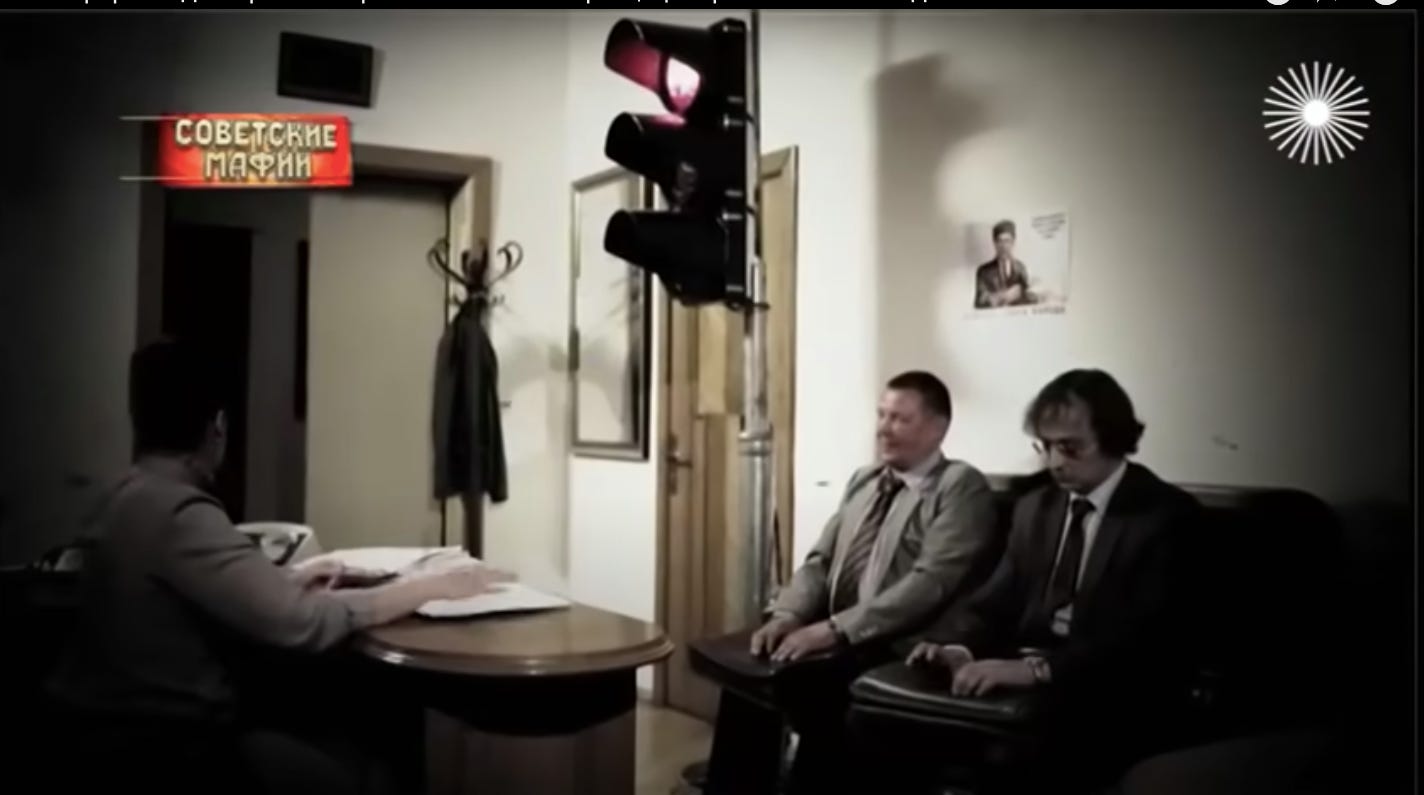
Former KGB lieutenant colonel Vladimir Popov, who served from 1972 to 1991 and later emigrated to Canada, dedicated a chapter of his book “Conspiracy of Scoundrels” to Vladimir Kantor. A state security officer writes that Kantor Sr. was fond of rowing and sailing, a hobby of many wealthy Soviet nomenclature officials. Rowing enthusiasts were even supervised by employees of the Fifth Directorate of the KGB, where Popov himself served. So, Kantor became friends with a colonel from this department, shared his income with him, and for years was completely untouchable, Popov claims.
However, after the death of Brezhnev and then Andropov, an internal struggle began between the security forces, and they decided to hunt Kantor in the UBKhSS. On April 1, 1985, the director of a department store was detained as he was leaving the entrance. Kantor’s apartment, as it turned out during the search, was literally stuffed with valuables: money was found under baseboards and in the frames of paintings, and jewelry was found in curtain rods and sockets. And not only the apartment: 25 years after those events, the head of the Moscow Police Museum, Lyudmila Kaminskaya, recalled the searches in the garage of Kantor’s son. The gate turned out to be double: inside there was a cavity filled with gold jewelry, she said in the NTV film. Also in the garage were USSR government bonds.
The operatives counted Kantor’s wealth for two days; the total value of the seizure was estimated at 622 thousand Soviet rubles, which approximately corresponds to $456 thousand or 41 million current rubles - not the most impressive amount by the standards of today’s corrupt officials, but huge for a Soviet person. In 1985, the average annual salary was approximately 2,300 rubles, that is, Kantor hid an employee’s salary for 270 years.
The director of Sokolniki spent four years under investigation; in 1989, the court sentenced him to eight years in prison; a week later Kantor died of a heart attack. As stated in the NTV film, the verdict came as a surprise: Kantor expected to be freed right in the courtroom. But the biggest question is raised by the son - the owner of that very garage with gold and government bonds. His name is not mentioned in the film, but Vyacheslav Kantor from the Forbes list is the only son of Kantor from Sokolniki; at the time of his father’s arrest, he was 31 years old. The investigation could well consider the garage owner an accomplice in the crime. But no criminal prosecution of Kantor Jr. happened.
Two Dossier interlocutors in the intelligence services claim that the future oligarch was saved by good relations with representatives of the First Main Directorate (PGU) of the KGB. In the late 80s, Kantor established two commercial enterprises, Composite and Intelmas, with PSU serving as their “roof,” sources say. Another interlocutor recalls the story of how Intelmas once purchased lighters worth a million dollars in Hong Kong, which turned out to be non-functional. Whether Kantor was really unlucky with this deal or whether it was only needed to withdraw money abroad remains a question for currency controllers, the source says. After the collapse of the USSR and the disappearance of the KGB, the First Main Directorate became the Foreign Intelligence Service. It was its personnel employees who became Kantor’s “roof” already during the times of big business, the interlocutors sum up.
Vyacheslav Kantor did not answer Dossier’s question about whether he knew about his father’s hiding place in his garage.
How sanctions helped us discover the former deputy director of the SVR among Kantor’s business partners
The Dossier Center was able to document the words of our sources about Kantor’s connection with a high-ranking representative of the Foreign Intelligence Service. Oddly enough, it was the recent sanctions against the oligarch that helped do this.
Kantor's main business since the early 90s has been the Acron enterprise. This is a chemical plant left over from Soviet times in Veliky Novgorod, which Kantor received at a check auction, investing “several hundred kilograms of vouchers,” he later said in an interview. Kantor brought these vouchers on a cargo plane to a military airfield near Novgorod in an atmosphere of the strictest secrecy so that competitors would not interfere. Many years later, describing these adventures to a Vedomosti correspondent on the terrace of a restaurant in Sardinia, Kantor assured that no one was behind him, and a neighbor pilot helped with the plane. There is probably some shrewdness here: during the time of check auctions, a deputy director of the SVR named Yuri Zubakov, who held this high post in 1991-1996, could patronize Kantor.
To trace this connection, let’s fast forward to the present day. Acron Group is one of the world's largest producers of mineral fertilizers. Even after the start of the war, it continues to supply products to Western markets: for example, according to the results of nine months of 2023, 14% of revenue came from the USA and Canada, approximately 2.5% from the European Union and the UK. Therefore, Acron is forced to comply with sanctions rules.
When the main beneficiary, Vyacheslav Kantor, came under EU and UK sanctions in April 2022, Acron tried, at least on paper, to distance itself from him. Now almost 50% of the shares previously owned by Kantor have been transferred to trust management by three companies not formally associated with him, and the oligarch has 45% left. These three new companies belong to Acron's top managers. However, in these paper arrangements, we are interested in only one character - Aza Vyacheslavovna Zubakova, the general director of one of the companies.
We know the individual tax number (TIN) of Zubakova. The business database shows that this woman has not previously managed or owned any other business. Judging by open sources, Zubakova did not hold high positions either at Acron or anywhere else. However, for some reason, it plays an important role for the chemical holding company. Thus, according to the merged databases, in previous years Zubakova received at least a million rubles in payments from Acron and affiliated structures. And in 2018, Acron paid for Zubakova and her little son's tickets to the FIFA World Cup - only the holding’s top managers, the Kantor family, and VIP guests received such an honor.
So who is Zubakova? As we found out in the Dossier, she was the daughter-in-law of Yuri Antonovich Zubakov, now deceased, and in the past was a powerful security official, former deputy director of the SVR, and former deputy secretary of the Security Council.
How we discovered the connection between Aza Vyacheslavovna Zubakova and Yuri Zubakov from the SVR
Yuri Antonovich Zubakov, a former security officer, born on November 27, 1943, was registered at two addresses in Moscow: on Novocheremushkinskaya street 60/2 and in Nesvizhsky lane 12/1. Anton Yuryevich Zubakov, born in 1982, was registered at the same address, that is, his son. We know the mobile number of Zubakov Jr.: + 7 903 721 XXXX. The same number was left as a contact in the school.mos.ru system by Aza Vyacheslavovna Zubakova. She also acted as a guarantor for one of Zubakov Jr.’s bank loans. Before her marriage, Aza Vyacheslavovna bore the surname Sekretaryuk, and her little son has the patronymic Antonovich. From this, we conclude that Aza married Anton Yuryevich Zubakov.
Could Aza Zubakova independently become an important person for Acron, without the participation of her powerful father-in-law? This looks dubious if you study the woman’s biography from leaked databases and other sources. Aza was born in 1983 in Lviv, Ukraine, and received Russian citizenship in 2001. Throughout the 2000s, she worked in rather modest positions. For example, in one of the questionnaires, “I indicated my place of work as “salesperson.” And in 2009, she named the small Moscow company Alvix, which produces refractory products, as her employer. She got married no later than 2010, judging by the change of her maiden name from Sekretaryuk to Zubakova. After this, Aza got a more pleasant place of work - the organizing committee of the 2014 Olympic Games in Sochi. Her husband Anton Zubakov spent his whole life in cushy positions in state-owned companies - either in the structures of Rosatom or in Rosneft with an income of more than 7 million rubles a year.
Yuri Zubakov from the SVR was directly connected to Acron. In the fall of 2011, the 67-year-old security officer ceased to be the deputy secretary of the Russian Security Council, while remaining as an advisor to Nikolai Patrushev voluntarily. At the same time, Zubakov was accepted onto the board of directors of Acron as an independent director. Information about this can be found in the group's reports. True, already in 2012 Zubakov left the Acron SD.
78-year-old Zubakov died in the fall of 2022 and a few months after the company of his daughter-in-law Aza received almost 18% of Acron shares in trust. Indirectly, this may be a sign that the Zubakov family has always owned this share in Acron but chose to come out of the shadows only recently - against the backdrop of sanctions and, obviously, the advanced age of the former security official.
“Transferring property to real partners is one of the strategies to mitigate the effect of sanctions. Also in Russia, the practice of using trusted persons with family or other close connections is very common; they are placed in key positions in controlled assets,” says Olga Lautman, a senior fellow at the Center for European Policy Analysis (CEPA), in a conversation with a Dossier correspondent.
At the time of preparation of this investigation, Acron’s capitalization on the Moscow Exchange was approximately 660 billion rubles. This means that Zubakov’s daughter-in-law controls shares with a market value of about 120 billion rubles or $1.3 billion.
What is Yuri Zubakov known for and how he participated in Putin’s hybrid war
Yuri Zubakov is a fairly typical representative of Putin’s elite: a former security officer turned billionaire. After graduating from the KGB Higher School, he served in the authorities since 1966. In 1991-1996, he was deputy director of the Foreign Intelligence Service, which was then headed by Yevgeny Primakov. When Primakov became Minister of Foreign Affairs, Zubakov followed him to the Foreign Ministry, and after Primakov was appointed prime minister, Zubakov headed the apparatus of the Russian government.
However, then his paths with Primakov diverged. Zubakov became Ambassador Extraordinary and Plenipotentiary of Russia, first to Lithuania, then to Moldova. And in 2004-2011 he was Deputy Secretary of the Russian Security Council.
Even while holding the non-power post of ambassador, Zubakov participated in Putin’s hybrid wars. During the Moldovan period of his career, he tried to push through Moscow’s plan for resolving the Transnistrian conflict, which was unacceptable for Chisinau, the Kommersant newspaper wrote many years ago. However, Zubakov’s mission as an ambassador quickly failed, and he was placed in the chair of Deputy Secretary of the Security Council. Already there, he continued to work on plans to subjugate Moldova, including through economic sanctions and pressure, Kommersant wrote.
How Kantor spent almost a million rubles on the vacation of a Smolensk United Russia deputy
Another thread connecting Acron with the authorities was discovered in the Smolensk region. On November 11, 2022, two payments were made from the account of Acron Group JSC in Raiffeisenbank to the Moscow travel agency Travelaris. Both were accompanied by a note “for a hotel room and service fee for Yuri Chernyak.” The total amount is more than 860 thousand rubles. The Dossier Center received this information from a source with access to Acron Group bank accounts. Travelaris positions itself as “personal travel management for those who are not satisfied with standard solutions.”
How we verified our source's information on bank payments
The source provided us with many bank transactions of Acron Group JSC. We compared them with the payment information contained in the company's official records and found many matches.
For example, according to the annual financial statements of Acron Group, in 2022 the company received 5,351,237,300 rubles in dividends from Acron PJSC. The same posting is also found in the source documents: 5.3 billion rubles came from the account of Acron PJSC on March 18, 2022.
In 2022, Acron Group spent 509.702 million rubles on the purchase of shares (stakes) of other companies, as can also be seen from the financial statements. The source has the same information: 139.542 million rubles were transferred in February for a share in Nikulinskoye LLC and 370.160 million in March for a share in Starosmolenskoye LLC, which follows from the transactions.
Finally, Acron Group’s reporting mentions the details of the company’s agreements for the lease and sublease of premises and telephone communications. We found contracts with the same details in the source documents.
JSC Acron Group is completely controlled by Vyacheslav Kantor, the reports say. But who is Yuri Chernyak, whom he has benefited from? There is no such person among Acron’s top managers.
The Dossier suggested that we are talking about the deputy of the Smolensk Regional Duma, Yuri Aleksandrovich Chernyak. This region is one of the key ones for Acron; the Dorogobuzh enterprise is located there, the second most important asset after the chemical plant in Veliky Novgorod.
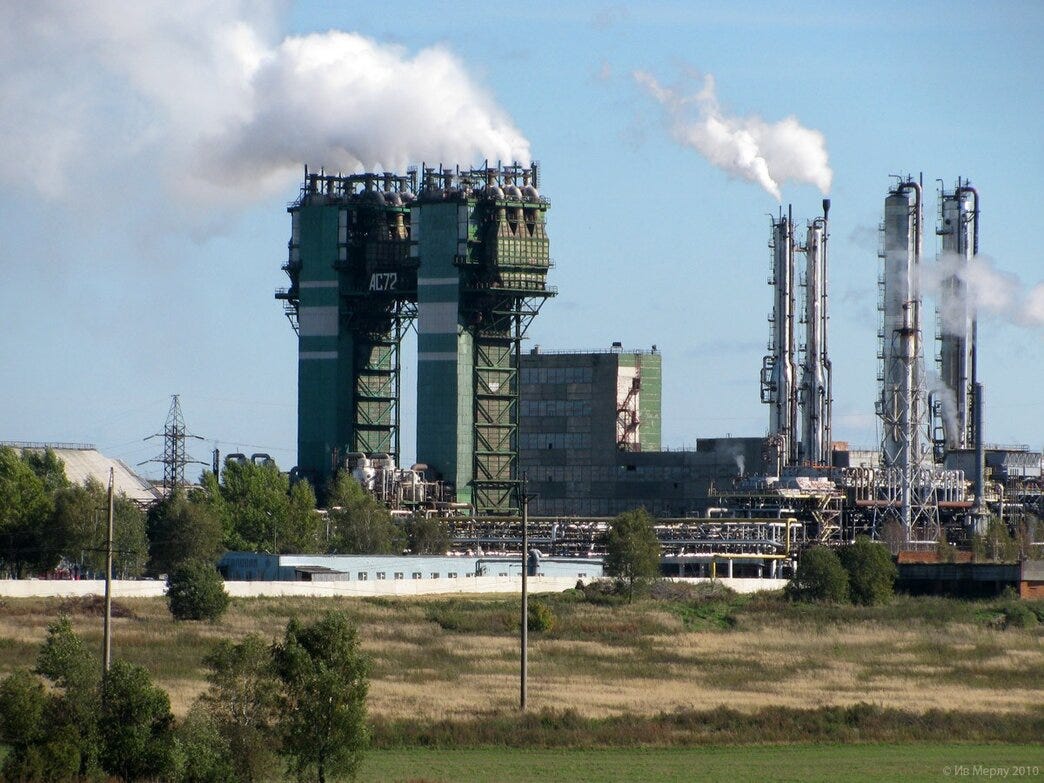
To test our hypothesis, the Dossier correspondent called the Travelaris travel agency under the guise of Yuri Aleksandrovich Chernyak’s assistant. According to the conversation, he really liked the hotel where he stayed in the fall of 2022, now Chernyak wants to know if there is a free room in April. The co-owner of the travel agency, Tatyana Gurochkina, told us. She stated that in the fall of 2022, Chernyak could have “a million trips [through Travelaris]” and asked to clarify the dates and name of the hotel (the Dossier has a recording of the conversation). Having dictated her number, the interlocutor ordered us to send an exact request to WhatsApp, but she stopped answering our calls and messages, probably suspecting something was wrong.
But after this conversation, there was no doubt that the full name of the Travelaris client was Yuri Aleksandrovich Chernyak. According to the leaked databases studied by the Dossier, there are only four Yuri Aleksandrovich Chernyaks among adult citizens of Russia. One of them is a pensioner from Tver, another is a freight forwarder from Samara, the third is the owner of a small forestry business from the Irkutsk region, and the fourth is just a Smolensk deputy. It does not seem that the first three may be of interest to the Acron holding: due to their advanced age, the presence of a large number of overdue bank loans, and other reasons. Therefore, we can summarize: Vyacheslav Kantor paid for a luxurious vacation for the full namesake of the Smolensk deputy.
Yuri Chernyak is 61 years old, he is a member of the United Russia party and has been sitting in the Smolensk Regional Duma for more than twenty years. The deputy is a member of the Committee on Property and Land Relations, and also, what is especially amusing, sits on the Anti-Corruption Commission.

“Dossier” sent a question about a vacation at Acron’s expense to Deputy Chernyak via Telegram. Having read it, he immediately blocked the correspondent.
Duty officer for “Jewish Europe” in Putin’s service
“In 1999, he [Putin] was appointed heir to the throne,” Vyacheslav Kantor explained to a Vedomosti correspondent in 2015, sitting in a restaurant in Sardinia.
By that time, the annexation of Crimea had already occurred and the war in Donbas had begun, but Kantor expressed admiration for Putin, bordering on servility. It turns out that he remembered for the rest of his life the date of Putin’s (then acting Prime Minister) first visit to the Acron plant - August 20, 1999. This visit was planned by his predecessor Sergei Stepashin, but Putin did not cancel it, because people were waiting for him at the plant. “This is a man of certain values. And I was not deceived by him,” Kantor recalled.
Since then, he has met with Putin more than once - in 2016 alone, the president managed to attend a meeting of the European Jewish Congress, which is headed by the billionaire, present Kantor with an order of honor and, together with the oligarch, celebrate the launch of a new production at the Acron plant in Veliky Novgorod. Moreover, during Putin’s tour of the plant, Kantor managed to amaze even the constant correspondent of the presidential pool, Andrei Kolesnikov, with his servility.
In an interview with Vedomosti, Kantor seemed to speak to the journalist in the language of Kremlin manuals (propaganda). Europe is not independent, but subordinate to the United States. Tolerance must be limited by security requirements - and this was said in response to a question about the Russian opposition. The decline in the Russian economy is a temporary phenomenon. Finally, the cherry on the cake: the murder of Boris Nemtsov (with whom Kantor was well acquainted) - it turns out that it was a provocation of enemies against the Kremlin. However, by the time of the interview, it was already known that the deputy commander of Kadyrov’s Sever battalion, Ruslan Geremeev, was behind the murder and that the Moscow security forces who flew to Chechnya could not even interrogate him.
The Vedomosti correspondent noted that the Russian economy is stagnating, there is corruption and a poor investment climate in the country, and many people prefer to leave. But Kantor also found a counterargument to this - some people, on the contrary, return to Russia. The businessman cited himself as an example: he spent many years abroad, but now he feels more comfortable working and living in Russia. True, in exactly the same interview, the oligarch mentioned that he spends most of his time in London, and during school holidays he lives with his family in Sardinia. And when much later Kantor came under sanctions, it turned out that the businessman who preferred to live in Russia had as many as 11 villas in Italy.
Kantor spoke the language of Kremlin manuals not only with Vedomosti. In general, his public activities were often devoted to promoting Putin’s propaganda and whitewashing the Russian president in the eyes of the whole world. Back in 2005, Kantor headed the Russian Jewish Congress, an organization created by businessmen Vladimir Gusinsky and Mikhail Fridman, lawyer Henry Reznik, orientalist Evgeny Satanovsky and other famous people. Since then, the oligarch has promoted himself along the Jewish line. He soon became president of the European Jewish Congress (EJC) or, as Kantor put it for Vedomosti, “the chief man on duty for Jewish Europe.”
The businessman was continually criticized by other prominent representatives of the European Jewish community. It was said that he was not so much fighting xenophobia or supporting the memory of the Holocaust as playing in favor of Putin. While repression was intensifying in Russia, Kantor talked about the low level of anti-Semitism in Russia and how comfortable life is for Jews here. And after the events of 2014 - the annexation of Crimea and the start of the war in Donbas - he also began to mention neo-Nazis in Ukraine, under whose influence the authorities there allegedly are.
Particularly noteworthy—in the context of neo-Nazis—is Kantor’s speech on March 30, 2014, in St. Petersburg at an event dedicated specifically to neo-fascism in Europe. Sitting next to Russian Railways President Vladimir Yakunin, a close friend of Vladimir Putin, Kantor gave detailed examples of modern neo-Nazis - the Golden Dawn party in Greece and Jobbik in Hungary. The French National Front, the Dutch Freedom Party, the Austrian Freedom Party, the Belgian Flemish Interest Party, the Italian Northern League, and the Swedish Democrats were also mentioned. However, there were no Ukrainians on this list of ultra-rightists at all. According to Putin’s current version, in Ukraine in 2014 there was a coup d’etat led by neo-Nazis, for the sake of protecting the Crimeans from whom Russia annexed Crimea. But in his nearly twenty-minute speech on March 30—just a couple of weeks after the annexation of Crimea—Kantor did not mention any Ukrainian neo-Nazis. They appeared to him later - perhaps when the Kremlin’s manual on this matter was finally established.
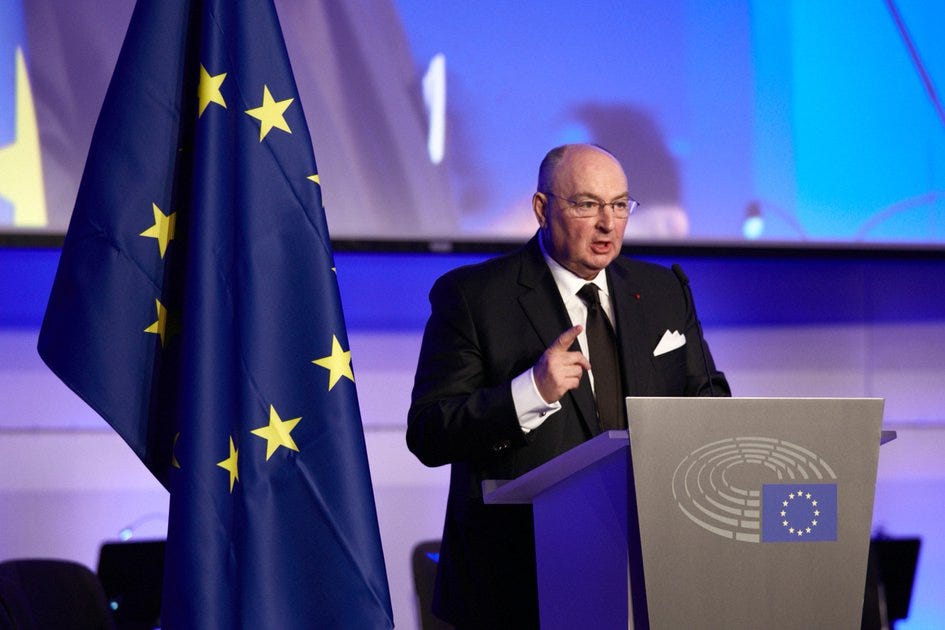
Because of his warm relationship with Putin, Kantor has found himself in international scandals. For example, in 2020, in Jerusalem, at the Yad Vashem memorial complex, events were held to commemorate the victims of the Holocaust, organized by the Russian oligarch’s foundation. More than 40 world leaders arrived, but everything looked as if the forum was designed exclusively for Vladimir Putin - it was he who became the central figure, the BBC article noted. Vyacheslav Kantor dedicated his speech at the forum to praising Russian laws against extremism - the same ones under which people received long-term sentences for memes and posts on social networks. From Kantor’s words it followed that with the help of these repressions, Vladimir Putin was able to achieve a record reduction in the level of anti-Semitism in Russia. At the same time, historical reality was distorted in the forum materials - for example, the Molotov-Ribbentrop Pact and the subsequent division of Poland between the USSR and Nazi Germany were not mentioned. Later, a representative of the Yad Vashem complex even had to apologize for the event.
Acron's earnings allowed Kantor to be the “chief duty officer for Jewish Europe.” Millions of dollars received by chemical companies in Russia were invested in the European Jewish Congress, based in Luxembourg. Kantor created a reputation for himself as a Jewish philanthropist on a global scale. When the oligarch came under sanctions, the EEK also lost its influence. Now this organization is huddled in a small office and is on the verge of survival, the Haaretz newspaper claimed.
But Kantor finally had a chance to live in Russia, where, according to his own words, he was very comfortable. There is an opportunity to get to know Vladimir Putin better, because in the same conversation with Vedomosti, Kantor lamented: “Friendship is a two-way traffic. I may be a friend of Putin, but I don’t know if he is a friend of mine.”
The Acron press service did not answer questions from the Dossier center addressed both to the group and to Vyacheslav Kantor personally.





